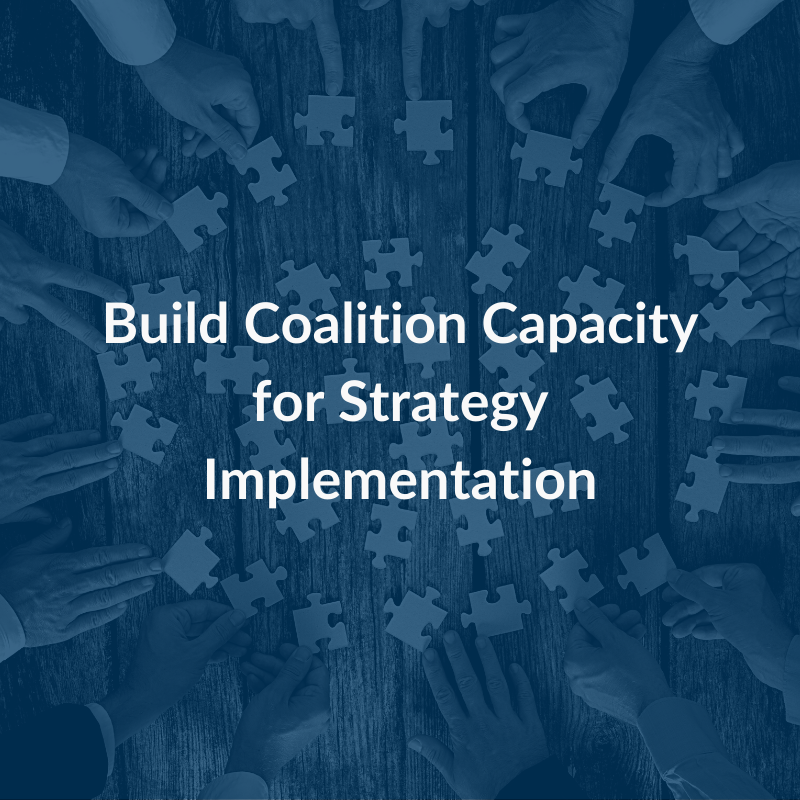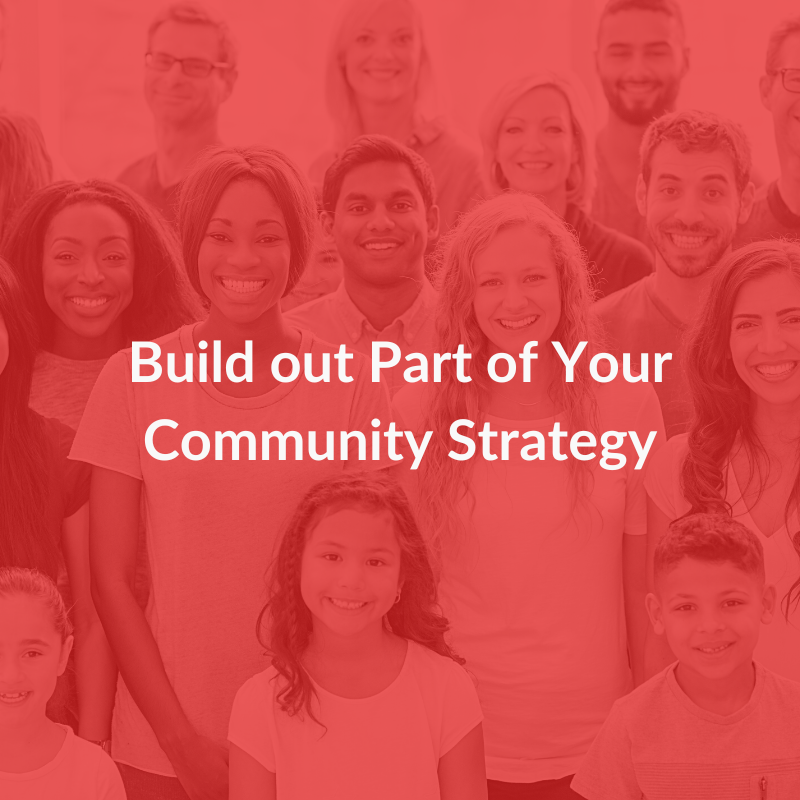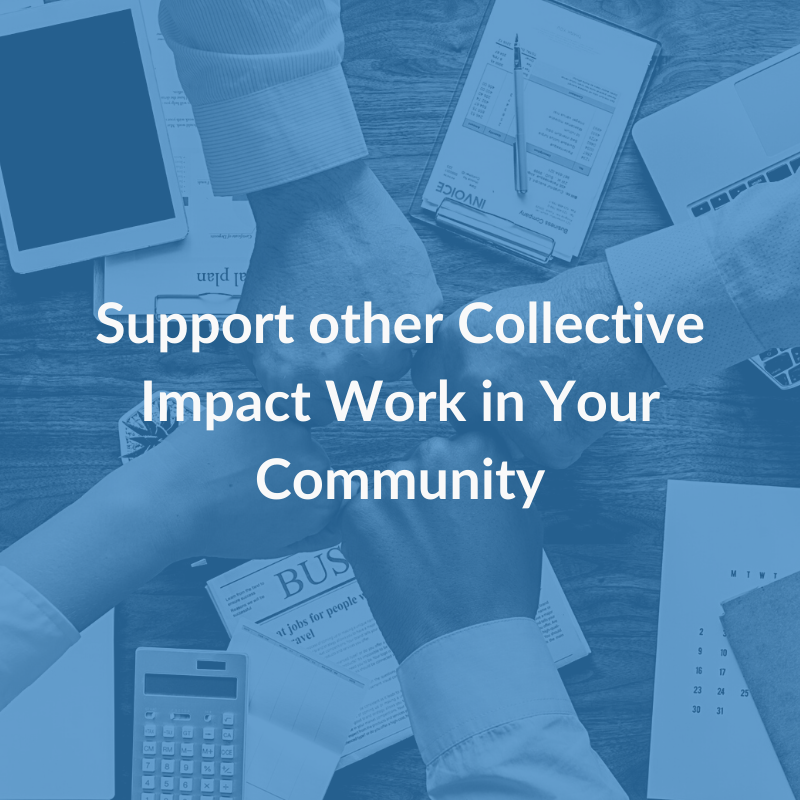August 24, 2023 - July 31, 2024
Get the Tools and Coaching Your Community Needs to Implement a Collective Impact Model.
Engage and equip your coalition with game-changing resources in this powerful 12-month program that helps you break down silos and begin working as a collaborating, cohesive community to address your most complex priority issues.
The CSEA 2023 Program will run from:
August 24, 2023 to July 31, 2024
Watch this 60-second video
-
This is a “Learning by Doing” program which focuses upon developing and implementing community-wide strategies. This hands on approach allows you to address an issue from your community while learning the techniques to develop and manage multi-faceted strategies to achieve a collective impact or system change.
-
We know people are busy. We’ve designed this to fit into your already-packed schedule. It combines flexible, self-paced learning with live workshops (which are recorded if you can't attend live) and modest tasks for your team each month.
We understand how busy coalition members can be, so we've enhanced the program by increasing the professional support each month. Our consultants will pitch in to help you recruit and onboard coalition members, suggest and refine strategy elements, develop measures and action plans. (We can't do everything for you, but we can leverage our experience to help accelerate your progress.)
-
InsightFormation’s 2023 CSEA Program is an ideal opportunity for communities, coalitions, organizations and individuals’ to significantly enhance their capacity to employ cutting edge tools and techniques to address today’s most complex health and social issues.
-
The program is ideal for coalitions working to address wicked, large issues such as:
• Dementia and Alzheimers Disease
• Adverse Childhood Experiences (ACEs) and Resilience
• Transforming the Family Justice System
• Housing affordability, evictions and homelessness (ADU Focused)
• Child abuse and Domestic violence
• How to Preventing and Address substance abuse
• Early childhood and positive youth development
• Chronic disease prevention
• Community Health Improvement Plans
• Transforming child welfare and foster care
• And other similar challenges
-
The 2023 CSEA is well suited to use available funding through:
• Elementary and Secondary School Emergency Relief (ESSER) funds
• Public Health Infrastructure funding
• Canada's Community Services Recovery Fund (CSRF).
• Hospital Community Benefit dollars
• Community Development Block Grants
• and many funding sources for specific issues.
We can offer you some suggestions on how to apply.
Our unique approach to co-creating and implementing large-scale strategies for complex social issues will provide you with the skills to make your collaboration successful. Our approach was featured in a peer-reviewed article in the Journal of Change Management, “Leading Social Transformation: Creating Value and Advancing the Common Good.” (See webinar.)
Learn to overcome common coalition obstacles.
Many coalitions experience one or more of the following:
A Lack of…
Cooperation: Agencies struggle with how to partner together.
Alignment: Existing efforts are fragmented and therefore less effective.
Coalescence: Partners struggle to define roles and responsibilities
Time: Developing effective strategies, plans, etc. requires more time than busy staff have available.
Resources: Partners have difficulty locating and/or agreeing on the best resources.
Funder Alignment: Funders continue to set up competitive grant processes, forcing agencies to compete.
Understanding of how to get ESSER or other CSRF funding.
Why Strategy Maps?
As a Member of the Community Strategy Engagement Accelerator, You will:
Select a strategic area to focus on (1x at the beginning of the program)
Develop a Collaborative Strategy (up to 4 hours per month)
Attend Monthly Interactive Content workshops (90 minutes per month)
Complete eLearning classes each month (60 minutes per month)
Receive Individual Coaching Sessions (60 minutes per month)
In addition, members will have access to:
eLearning Mastery Course
Monthly Theory and Technique Workshop (90 minutes per month)
Monthly "Office Hours" with Bill Barberg (offered at least 2x per month)
Individual Session with an IFI Consultant (1 x per month)
Opportunity to participate in peer discussions (1 x per month)
IFI Staff assistance to support your Team’s
Option to Attend as an Individual or Organization
If you don’t expect your coalition to sign up for this program, you can still participate as a single organization or as an individual. (See registration page for details and participation fees.)
CSEA 23 is an upgraded version of the ARRCC Action Network.
Here’s what participants had to say about the ARRCC Action Network:
Meet Your Instructors
Bill Barberg
Co-founder of the Population Health Learning Collaborative, is the President and Founder of InsightFormation, Inc., a Minnesota-based consulting and technology company that helps communities, regions, and states address complex social and health issues that require multi-stakeholder collaboration. His deep background in strategy implementation has been featured in dozens of conference presentations and webinars, and he both organized and hosted the recent virtual summit on Innovations in Naturally Affordable Housing. He has been a pioneer in many projects that have pushed forward the practices for achieving Collective Impact on a wide range of issues—from addressing the opioid crisis to transforming housing re-developments into Communities of Hope in Detroit.
Bill was selected to write the chapter on “Implementing Population Health Strategies” for the book, “Solving Population Health Problems through Collaboration” (Routledge, 2017). His recommendations for using strategy maps is featured as a core recommendation in the new report by the National Academy of Public Administration. Bill recently co-authored a paper for the Journal of Change Management on “Leading Social Transformations to Create Public Value and Advance the Common Good”.
Michael Quinn Patton
Founder and CEO of Utilization-Focused Evaluation, an independent organizational development and program evaluation organization. He has authored numerous books on evaluation, including Blue Marble Evaluation (2019), Principles-Focused Evaluation (2018), Facilitating Evaluation (2018), Developmental Evaluation (2010) and Utilization-Focused Evaluation (2008). He has also edited or contributed articles to numerous books and journals, including several volumes of New Directions in Program Evaluation, on subjects as diverse as culture and evaluation, how and why language matters, HIV/AIDS research and evaluation systems, extension methods, feminist evaluation, teaching using the case method, evaluating strategy, utilization of evaluation, and valuing. His creative nonfiction book, Grand Canyon Celebration: A Father–Son Journey of Discovery, was a finalist for Minnesota Book of the Year. He sits on the Editorial Advisory Board for The Foundation Review.
David Stroh
He is internationally recognized for his work in enabling leaders to apply systems thinking to achieve breakthroughs around chronic, complex problems and to develop strategies that improve system-wide performance over time. He has been described as “a magician” and “the master at providing interesting and useful ways to look at the complexity of systems thinking”, who “helped us tremendously in getting to the core issues” with “the mind of a scientist and the heart of a healer.”
David is the author of the best-selling book Systems Thinking for Social Change: A Practical Guide for Solving Complex Problems, Avoiding Unintended Consequences, and Achieving Lasting Results (Chelsea Green, 2015), which readers praise as “an essential – and long overdue – guide to applied systems thinking” that “shows you how to enlist others in the effort” by “masterfully weaving metaphor, story, and practical tools” using “down-to-earth language.”











